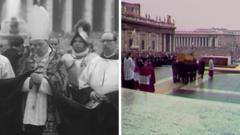
A Legacy in Remembrance: The BBC's Archival Journey Through Papal Funerals
A Historical Retrospective: Witnessing Transitions of Faith
For over half a century, the world has watched with solemnity and respect as the Catholic Church mourned and celebrated the lives of its Popes. From Pius XII to Benedict XVI, these moments of transition have been significant not only for the Church but for global society. The BBC, with its extensive archival resources, has documented these pivotal events, providing a unique lens through which to examine the evolving traditions, the shifting political landscape, and the enduring power of faith.
Pius XII (Died 1958): The End of an Era
The death of Pius XII in 1958 marked the end of an era. His papacy, spanning nearly two decades, was profoundly shaped by World War II and its aftermath. The BBC's coverage of his funeral offered a glimpse into a world still recovering from conflict. The ceremony, steeped in centuries of tradition, reflected the gravitas of the moment and the significant role the Pope played on the world stage. The footage reveals the large crowds gathered, a testament to his influence and the outpouring of grief felt worldwide.
Key Aspects of Pius XII's Funeral Coverage:
- The somber atmosphere reflecting post-war anxieties.
- The adherence to ancient liturgical practices.
- Global representation amongst mourners and dignitaries.
John XXIII (Died 1963): A Pope of Transition
Just five years later, the world mourned again with the passing of John XXIII. Known as the "Good Pope," his brief but impactful papacy ushered in the Second Vatican Council, a period of significant reform and modernization within the Church. The BBC's video from his funeral captures a sense of hope and renewal, contrasting with the somber tone of Pius XII's departure. The ceremony was attended by a diverse group, indicative of the bridge-building efforts of his pontificate.
Key Aspects of John XXIII's Funeral Coverage:
- Emphasis on ecumenism and interfaith dialogue reflected in the attendees.
- A palpable sense of hope for the future direction of the Church.
- Increased media coverage compared to previous papal funerals, showcasing growing global interest.
Paul VI (Died 1978): Navigating a Changing World
The funeral of Paul VI in 1978 reflected the complexities of his papacy. He navigated a world grappling with social and political upheaval, facing challenges to traditional doctrines. The BBC's coverage reveals a Church in transition, grappling with internal debates and external pressures. While the traditions remained, there was a clear sense of the challenges facing the institution.
Key Aspects of Paul VI's Funeral Coverage:
- Acknowledged the internal divisions within the Church at the time.
- Demonstrated the impact of global events on the papacy.
- Highlighted the ongoing debate surrounding Church teachings.
John Paul I (Died 1978): A Pontificate Cut Short
The sudden and unexpected death of John Paul I just 33 days into his papacy shocked the world. The BBC's coverage of his funeral reflects the profound sense of loss and disbelief. The brief nature of his reign meant that his funeral was a somber affair, overshadowed by questions and speculation. The ceremony, though traditional, was marked by a unique sense of urgency and sadness.
Key Aspects of John Paul I's Funeral Coverage:
- Profound sense of shock and mourning due to the brevity of his papacy.
- Heightened media scrutiny surrounding the circumstances of his death.
- A focus on the unexpected nature of life and leadership.
John Paul II (Died 2005): A Global Phenomenon
The death of John Paul II in 2005 marked the end of a transformative era. His 26-year papacy saw him travel the globe, connect with people from all walks of life, and become a global icon. The BBC's coverage of his funeral was unprecedented in its scope and scale. Millions flocked to Rome to pay their respects, and billions more watched on television. The ceremony was a celebration of his life and a testament to his enduring legacy.
Key Aspects of John Paul II's Funeral Coverage:
- Massive global participation, both in person and via media.
- Celebration of his life and impact on global society.
- Emphasis on his outreach to youth and his role in promoting peace.
Benedict XVI (Died 2022): A Theologian's Farewell
While not directly covered within the BBC's initial retrospective (ending in 2013), the funeral of Benedict XVI in late 2022 and early 2023 deserves mention. As the first Pope to resign in nearly 600 years, his passing was a unique historical event. The BBC, along with other major news outlets, provided extensive coverage of his funeral, which was presided over by his successor, Pope Francis. The ceremony reflected his intellectual rigor and his dedication to theological scholarship.
Key Aspects of Benedict XVI's Funeral Coverage:
- Historical significance of a former Pope being mourned by his successor.
- Focus on his theological contributions and legacy.
- Reflection on the changing landscape of the papacy in the 21st century.
The Enduring Power of Ritual and Remembrance
The BBC's archival journey through these papal funerals offers a compelling glimpse into history, faith, and the human condition. These events, steeped in tradition and symbolism, serve as powerful reminders of the enduring power of ritual and remembrance. They allow us to reflect on the lives and legacies of these influential figures and to consider the ongoing evolution of the Catholic Church in a rapidly changing world. The footage is more than just historical record; it is a testament to the global impact of the papacy and the enduring human need for connection, meaning, and spiritual guidance.
